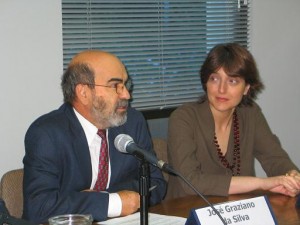INSIDER VIEW : Hunger for Power

Brazil has at last confirmed its candidature for the election next year to the FAO leadership, raising hopes for an end to the rudderless epoch under the water-tredding Senegalese director general, Jacques Diouf.
Rio di Janeiro’s experienced nominee, José Graziano da Silva, enjoys a major advantage over his Indonesian rival of inside knowledge of the workings and personalities of the byzantine Rome-based organisation, a quality that gave Nigerian hungercrat Kanayo Nwanze the edge in the election to FAO’s sister agency IFAD last year.
As usual with FAO elections, however, the final outcome remains uncertain until a consensus is reached amongst diplomats representing member states in the smoke-filled cocktail parties held in the crucial days before the vote when deals are struck. In an echo of the conclaves held for papal elections on the other side of the Tiber, many governments reserve their final decision until last minute when they sense who the winner is going to be and join the herd. Although the vote is in principle secret, everyone wants to tell the new DG truthfully how glad they are they supported him.
The unctuous climate was not lost on Juan Carlos Vignaud, the brave Argentine candidate who challenged Mr Diouf in 1999, obtaining numerous promises of support during a campaigning tour to more than 60 countries around the world, only to see most of them desert him with the notable exception of Britain and a clutch of other reform-minded states.
Among those who dropped Senor Vignaud was, shamefully, the U.S. Agriculture Department, which must have had cause to regret the decision given the demoralised state of the FAO in recent years as the angry resignation of James Butler as No. 2 man at the agency demonstrated.
A Brazilian victory in June should guarantee not just a brighter and more inspired future for the FAO but for the U.N. food agencies in general including IFAD and WFP.
The winner will have to contend with pressure from the example of Mr Nwanze and his Macchiavellian, market-driven inner circle at IFAD where controversial plans have been under discussion to take their troubled agency out of the U.N. pension and pay systems.
That is a prospect that would leave the rural poverty-fighting organisation vulnerable to reduced transparency in accountancy and a further slump in morale in the wake of Mr Nwanze’s profligate spending on his luxury villa on the Via Appia Antica.


